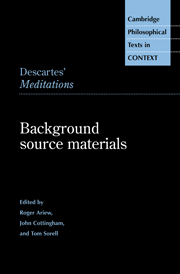Book contents
- Frontmatter
- Contents
- Preface
- Abbreviations
- General Introduction
- 1 Dialectic
- 2 That Nothing Is Known
- 3 The Promotion of Mathematics
- 4 Metaphysical Disputations
- 5 Wisdom
- 6 A Compendium of Philosophy in Four Parts
- 7 Corpus of Philosophy
- 8 The Use of Reason, The Impiety of the Deists, and The Truth of the Sciences
- 9 Unorthodox Essays against the Aristotelians
- 10 The Two Truths and The Immortality of the Soul
- 11 Dialogue on the Diversity of Religions and Little Skeptical Treatise
- 12 Universal Science
- 13 That God Exists
- Appendix: Condemnations of Cartesianism
- Bibliography
- Index
9 - Unorthodox Essays against the Aristotelians
Published online by Cambridge University Press: 05 June 2012
- Frontmatter
- Contents
- Preface
- Abbreviations
- General Introduction
- 1 Dialectic
- 2 That Nothing Is Known
- 3 The Promotion of Mathematics
- 4 Metaphysical Disputations
- 5 Wisdom
- 6 A Compendium of Philosophy in Four Parts
- 7 Corpus of Philosophy
- 8 The Use of Reason, The Impiety of the Deists, and The Truth of the Sciences
- 9 Unorthodox Essays against the Aristotelians
- 10 The Two Truths and The Immortality of the Soul
- 11 Dialogue on the Diversity of Religions and Little Skeptical Treatise
- 12 Universal Science
- 13 That God Exists
- Appendix: Condemnations of Cartesianism
- Bibliography
- Index
Summary
Introduction
Pierre Gassendi (1592–1655), one of the major figures of the seventeenth century, was a philosopher, theologian, classicist, experimental physicist, and astronomer. Initially he was a priest at Digne and college professor at Aix (both in southern France), but his teaching was interrupted when the Jesuits took over his college. His philosophical career continued under the patronage of Fabri de Peiresc, who introduced him to the intellectual community in Paris; after Fabri's death, Cardinal Richelieu's brother, the archbishop of Lyon, procured for him a professorship of mathematics in the Collège Royal. In Paris, Gassendi was associated with the circle around Mersenne, which provided him with the opportunity to set his Neo-Epicurean views in contrast with those of Descartes, who was in correspondence with Mersenne's circle. The occasion resulted in Gassendi's best-known works, the Fifth Set of Objections to Descartes' Meditations and the subsequent Disquisitio metaphysica. Paris also provided for Gassendi a close association with a group of libertins érudits, and even closer friendship in the Tetrade, the subset of libertins that included Gabriel Naudé, Elie Diodati, and François de la Mothe le Vayer. Though most of his life (from about 1626 on) was devoted to his Christian rehabilitation of Epicurus' philosophy, his first published work, Exercitationes paradoxicae adversus Aristoteleos (1624) was a skeptical attack on Aristotelianism. In the preface to the first book, Gassendi sketches a multivolume project to provide an antidote to dogmatism by attacking the most seemingly secure Aristotelian doctrines taught in the schools.
- Type
- Chapter
- Information
- Descartes' MeditationsBackground Source Materials, pp. 166 - 175Publisher: Cambridge University PressPrint publication year: 1998



